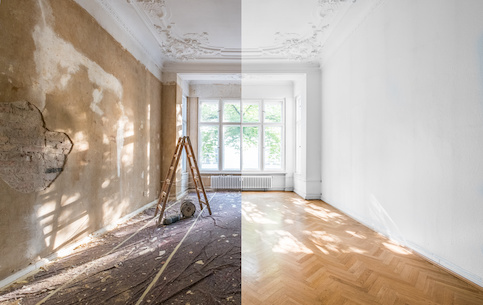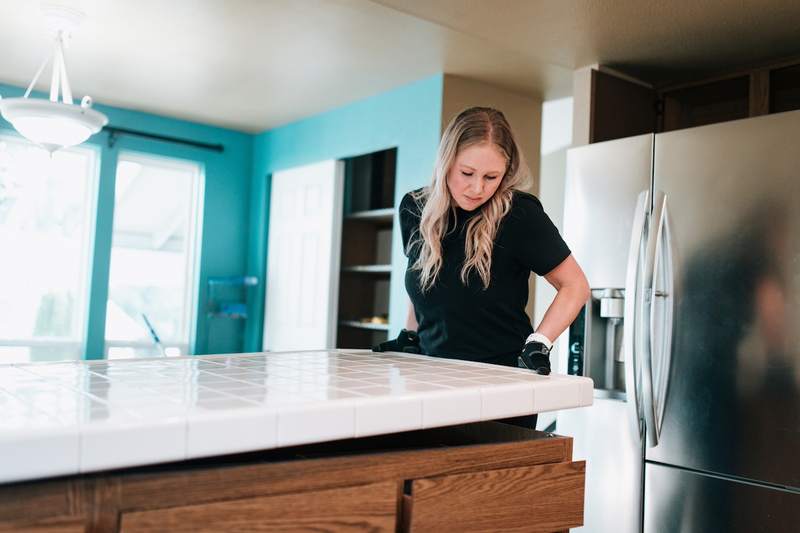Department of Veterans Affairs (VA) home loans are mortgages specifically designed for veterans and active-duty military personnel. These government-backed loans have stricter requirements to make sure homes meet habitability standards. Since VA loans have different requirements than other mortgages, it’s common to have questions about the VA appraisal and inspection processes.
Let’s take a look at VA inspection requirements, the benefits of getting an inspection with a VA home loan and the difference between a home inspection and a home appraisal.
What Is A VA Loan?
VA loans are backed by the federal government through the U.S. Department of Veterans Affairs. Potential recipients of VA loans include eligible active-duty service members, reservists, National Guard personnel and veterans along with surviving military spouses who meet certain qualifications. VA loans typically offer the perks of no down payment, a competitive interest rate and the absence of a private mortgage insurance (PMI) requirement.
Make sure you understand the specific eligibility requirements of VA loans before applying for one.
See What You Qualify For
Buy A Home
Discover mortgage options that fit your unique financial needs.

Refinance
Refinance your mortgage to have more money for what matters.
Tap Into Equity
Use your home’s equity and unlock cash to achieve your goals.
What Is A VA Home Inspection?
VA home inspections are essentially just like any other home inspection. Inspectors will look at the interior and exterior of the home. This extra information helps the potential home buyer make an informed choice about potential problems with a property and any necessary repairs. Home inspections are optional, but it’s common practice to get a home inspection to identify problems before closing on your mortgage.
A home inspection is usually arranged and paid for by the borrower. The typical cost range for a home inspection is between $281 and $402.
Does A VA Loan Require An Inspection?
The VA doesn’t require home buyers to get an inspection, but it’s highly recommended. Home inspections add an extra layer of buyer protection. For example, if a problem comes up during inspection you can address it with the seller before you purchase the home.
You may be able to negotiate so that the seller will pay the cost to fix any problems or lower the asking price. However, you won’t always be able to get a seller to cover costs. For example, in a seller’s market homeowners are less likely to agree to repairs.
Though a general home inspection is not required for a VA loan, certain types of inspection might be required. For instance, VA loans require a separate pest inspection in certain geographic areas.
Appraisers may also require further inspections if they suspect specific problems with the property. If your appraisal uncovers problems that need further inspection, your VA lender can help connect you with an appropriate expert.
Guide to VA Loans
Discover a more affordable loan option for United States Veterans, Service Members and spouses.
What’s The Difference Between VA Home Inspection Vs. VA Home Appraisal?
A home inspection takes a deeper dive into examining the condition of a home – both inside and out. It can turn up unexpected issues that might not be discovered during a typical home appraisal so you can address them with the seller. In contrast, a home appraisal is intended to determine the condition of a home and decide the home’s overall value.
That said, the VA’s home appraisal process is unusual because it’s more thorough than a regular home appraisal and it has requirements that are specific to VA loans.
Let’s take a quick look at VA home appraisals and VA-specific requirements.
VA Home Appraisal
Unlike a home inspection, a VA home appraisal will be required by your mortgage lender. VA home appraisals ensure your new home meets the VA’s minimum property requirements (MPRs) which protect veterans from buying a house that’s unsanitary or unsafe.
The appraiser will also look at the property and similar homes in the neighborhood to determine the fair market value (FMV) of the home you hope to buy. Like any other appraisal, your lender will want to see that the home is worth the asking price. If the appraisal is too low you’ll need to renegotiate with the seller, pay the difference in value at closing or find a different home.
VA Minimum Property Requirements (MPRs) Checklist
In addition to the regular appraisal concerns a VA loan appraisal needs to meet the MPRs required before you can close on a VA loan.
VA appraisals are more thorough than a standard appraisal and will check a wide range of requirements including but not limited to:
- Space
- Access and encroachment
- Drainage and topography
- Hazards areas
- Utilities
- Water supply, sanitary facilities, and sewage disposal systems
- Home structure
- Zoning and building codes
- Pest inspection
- Attics, crawl spaces, and basements
This more thorough appraisal process holds properties to a higher standard to ensure veterans are getting a home that’s right for them and their families.
VA Home Loan Inspection Requirements
The VA doesn’t require a homeowner to get a home inspection, so inspection requirements aren’t standardized. The requirements are similar to a regular home inspection. The inspector should thoroughly examine the interior and exterior of the home. This includes the home’s HVAC, plumbing, electrical system, attic and roof.
To give you a better idea of what should take place during a home inspection, we’ve compiled a checklist.
VA Home Loan Inspection Checklist
Your home inspector should carefully check the real estate property from top to bottom. Their home inspection checklist should include:
- Exterior (walkways, siding, trim, decks, patios)
- Gutters
- Roof (shingles, flashing, moss growth)
- Attic and insulation
- Wall structure
- HVAC
- Plumbing
- Electrical
- Lead paint
- Pest and termite damage
- Floors and ceilings
- Doors and windows
- Steps, stairs and railings
- Fireplaces
- Smoke and carbon monoxide detectors
- Countertops
- Foundation and floor structure
Should You Get A VA Loan Inspection?
Since a home inspection isn’t required with a VA loan, some borrowers might not get one. Although it costs you money upfront, a home inspection provides detailed information on the condition of the home that might not come up during an appraisal.
If the inspection process brings something problematic to light, the necessary repair could cost thousands of dollars. Knowing about potential issues ahead of time allows you to negotiate with the seller to pay for the cost of repairs before you make a final commitment.If you skip the inspection, any problems that pop up once you buy the property will be your responsibility.
Benefits Of A VA Home Loan Inspection
Even though a home inspection isn’t required for a VA loan, there are some potential benefits to opting for an inspection. Let’s take a look at a few reasons to get an inspection.
- Peace of mind: The comfort that comes with knowing you’re buying a house in good condition is hard to beat. A home inspection can help you feel like you’ve thoroughly evaluated your potential home before finalizing your purchase.
- Inspection contingency: If you’re planning to get a home inspection you can add a home inspection contingency clause to your real estate contract. This clause gives the seller a certain amount of time to fix any issues found during the inspection. If the seller refuses to fix the problem, you can walk away without losing any money.
- Negotiating power: A home inspection also gives the buyer some extra negotiating power. If you find an issue with the home, you can ask the seller to lower the sales price or pay to fix the issue.
The main benefit of a VA loan inspection – or any home inspection – is learning the ins and outs of your potential new home. An inspection helps you learn everything you can about the property and its systems.
See What You Qualify For
You can get a real, customizable mortgage solution based on your unique financial situation.
The Bottom Line: VA Home Loan Inspections Are Recommended, Not Required
It might be tempting to skip out on a home inspection due to the extra cost and inconvenience, but getting an inspection is a long-term investment in your home. Though the VA doesn’t require a home inspection, it can reveal underlying issues that might change your mind about your purchase. If you discover problems during a home inspection you can ask the seller to fix the issue or lower the sale price to make up for the cost of repairs.

Victoria Araj
Victoria Araj is a Staff Writer for Rocket Companies who has held roles in mortgage banking, public relations and more in her 15-plus years of experience. She has a bachelor’s degree in journalism with an emphasis in political science from Michigan State University, and a master’s degree in public administration from the University of Michigan.












